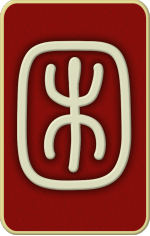
困 Kùn Exhaustion (Fatigued) [hexagram 47]


Lake over Water
 Metal element
Metal element
Lunar month: 9 ; Host (controlling) line : 2
The Decision
Exhaustion – fulfillment and persistence. For great people this is promising. No fault, yet words lack conviction.
Exhaustion – strength obscures the weak. There is danger then fulfillment. Surely the wise though struggling will make progress? ‘Persistence by great people leads to good fortune’ – due to inner strength. ‘Words lack conviction’ – relying on speech leads to restriction.
困: 亨, 贞, 大人吉, 无咎, 有言不信. Kùn: hēng, zhēn, dà ren jí, wú jiù, yǒu yán bù xìn.
彖传: 困, 刚掩也. 险以说, 困而不失其所, 亨; 其唯君子乎?贞大人吉, 以刚中也. 有言不信, 尚口乃穷也. Tuàn zhuàn: Kùn, gāng yǎn yě. Xiǎn yǐ shuō, kùn ér bù shī qí suǒ, hēng; qí wéi jūn zǐ hū? zhēn dà ren jí, yǐ gāng zhōng yě. Yǒu yán bù xìn, shàng kǒu nǎi qióng yě.
The Image
Lake without water forms ‘Exhaustion’. The wise accordingly stake their lives to fulfill their aims.
象传: 泽无水, 困; 君子以致命遂志. Xiàng zhuàn: Zé wú shuǐ, kùn; jūn zǐ yǐ zhì mìng suì zhì.
Line Change 1
Oppression – backside struck by a wooden cane. Entering a gloomy valley for three years – there is no deliverance.
‘Entering a gloomy valley’ – it is dark and the way forward bewildering.
初六: 臀困于株木, 入于幽谷, 三岁不觌. Chū liù: tún kùn yú zhū mù, rù yú yōu gǔ, sān suì bù dí.
象传: 入于幽谷, 幽不明也. Xiàng zhuàn: Rù yú yōu gǔ, yōu bù míng yě.
Line Change 2
Fatigued despite plenty of food and wine. Scarlet-sashed officials arrive with orders; productive to offer due sacrifice. Taking action leads to misfortune but there is no blame.
‘Fatigued through food and wine’ – however the middle position gives grounds for congratulation.
九二: 困于酒食, 朱绂方来, 利用享祀, 征凶, 无咎. Jiǔ èr: kùn yú jiǔ shí, zhū fú fāng lái, lì yòng xiǎng sì, zhēng xiōng, wú jiù.
象传: 困于酒食, 中有庆也. Xiàng zhuàn: Kùn yú jiǔ shí, zhōng yǒu qìng yě.
Line Change 3
Hindrance by rocks, grasping at thorns. Entering home but not seeing the partner – misfortune.
Grasping at thorns – lying on a strong line. 'Entering home but not seeing the partner' – inauspicious.
六三: 困于石, 据于蒺蔾, 入于其宫, 不见其妻, 凶. Liù sān: kùn yú dàn, jù yú jí lí, rù yú qí gōng, bù jiàn qí qī, xiōng.
象传: 据于蒺蔾, 乘刚也. 入于其宫, 不见其妻, 不祥也. Xiàng zhuàn: Jù yú jí lí, chéng gāng yě. rù yú qí gōng, bù jiàn qí qī, bù xiáng yě.
Line Change 4
Very slow progress. Hampered within a car. Regrets but only for a while.
‘Very slow progress’ – following a subordinate purpose. Although an inappropriate position there is some support.
九四: 来徐徐, 困于金车, 吝, 有终. Jiǔ sì: lái xú xú, kùn yú jīn chē, lìn, yǒu zhōng.
象传: 来徐徐, 志在下也. 虽不当位, 有与也. Xiàng zhuàn: Lái xú xú, zhì zài xià yě. suī bù dàng wèi, yǒu yǔ yě.
Line Change 5
Severe punishment for crimes. Maltreated by scarlet-sashed officials; gradually finding relief. Worthwhile to make a sacrifice.
‘Severe punishment for crimes’ – the aims have not yet been attained. ‘Gradually finding relief’ – the line is central and correct. ‘Worthwhile to make a sacrifice’ – in order to deserve contentment.
九五: 劓刖, 困于赤绂, 乃徐有说, 利用祭祀. Jiǔ wǔ: yì yuè, kùn yú chì fú, nǎi xú yǒu shuō, lì yòng jì sì.
象传: 劓刖, 志未得也. 乃徐有说, 以中直也. 利用祭祀, 受福也. Xiàng zhuàn: Yì yuè, zhì wèi dé yě. nǎi xú yǒu shuō, yǐ zhōng zhí yě. lì yòng jì sì, shòu fú yě.
Line Change 6
Injured by creeping vines trailing downwards. Proceeding slowly and carefully. If repent earlier transgressions there will be good fortune going forward.
‘Injured by creeping vines’ – not a proper action. ‘If repents earlier transgressions, there will be good fortune going forward.’ – making some progress.
上六: 困于葛藟, 于臲卼, 曰动悔. 有悔, 征吉. Shàng liù: kùn yú gé lěi, yú niè wù, yuē dòng huǐ. yǒu huǐ, zhēng jí.
象传: 困于葛藟, 未当也. 动悔, 有悔吉, 行也. Xiàng zhuàn: Kùn yú gé lěi, wèi dāng yě. dòng huǐ, yǒu huǐ jí, xíng yě.
The full set of 64 English translations is available in our new book 'Book of Changes - Deciphered' ➚.